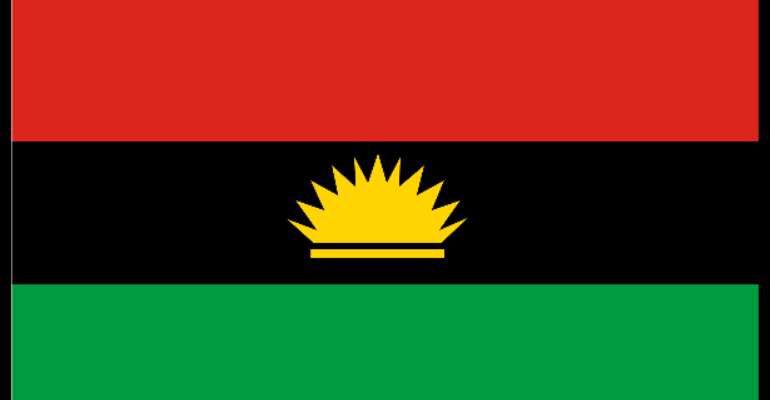WE ARE ALL BIAFRA

The federal government, through NBC may dismantle and confiscate the equipments of radio Biafra, they may jam its operating frequencies, they may denigrate its operator, Nnamdi Kanu, they may pan gimmicks – standing tall amongst their stunts is the expunging of history from our secondary school curriculum – to make us forget the unjust killings and massacres that occurred on the portion of God's real estate called Nigeria from 1967 through 1970, but that doesn't change the fact that Biafra Lives On.
We may not be tampered by war, but we see the evidence of Biafra manifest in our everyday lives. Like the lullaby of demons and symphonies of rueful songs made from hell screams, we hear Biafra in the tormented screams resonating across our perimeters.
We see its ghosts in the rivers of withered hopes that flow from the eyes of yet another Nigerian family who just lost its breadwinner to a Nigerian death – a death that could have been avoided if our health care system wasn't dysfunctional, if our roads weren't death traps, or if the Nigerian Medical Association detected only some weeks earlier that that medical doctor, who runs a private hospital and also practices at the Federal Medical Centre knows nothing because he cheated through medical school.
These evidences are served in different assortments: The tired smile of that overworked and belabored young man whose minimum wage take-home pay really can't take home or cater for the needs of his young wife, new born baby and aged mother. The educationally disadvantaged and misnomers of the North who now abduct our daughters, maim our sons, displace our mothers and fathers from their addresses, leave garbed skulls buried in the rubble of what yesterday was home, and litter our streets with twitched, scalded bodies and tore open skulls.
We may not be tampered by war, but Biafra is evident in the traces of dissatisfaction we see on the faces of the elderly and the hints and gazes of disappointments in the eyes of youths. We see it in the epileptic power that buoy and smother the dreams of young, budding entrepreneurs. Our olfactory organs testifies to the red smell of innocent blood, putrid human flesh and umpteen clandestine, extrajudicial killings – all searing and abiding scars of the pogrom
Tomorrow and every tomorrow thereafter, we'll run across that young unemployed graduate who is high on sorrow, drunk with pain and now carries a dark cloud over his head. He used to be a rabid optimist, but this country, the realities this country brought to his platter, made him a gloomy and moody pessimist. We'll come across that secondary school student who is surly, wondering if he'll ever amount to something in a country where his elder brother who graduated some five years ago still can't find a job.
Whether at the airport or in church or market or at the hospital, we must have had cause to experience that familiarity strangers adopt with each other after sharing in the disappointment of public service. Perhaps, when NEPA, as the street calls them or PHED, as the establishment calls them, seized power or when the gas station sold petrol at ridiculously high rates.
We must have seen that Nigerian, that white collar employee whose head is buried in worry because his company is about to downsize or right-size or merge with another or be acquired. We must have seen streets fevered with darkness or woke to the intemperate ardor of listening to hums and cacophonies of generators.
These shared misfortunes, these common woes and collective struggles for a better country, makes us all citizens of the land of the rising sun. If you have in anyway been a victim of shenanigans of national coyness, congratulations!
You are an esteemed citizen of the Republic of Biafra. The layer after layer of discontent that has settled and formed a mass in our minds' mind and leaves us standing valiantly, is the national passport of citizens of this great republic.
The idea may look idiotic on the face of it, but look beyond the shallowness. Take off your rose colored lenses and you'll see that Biafra is deeper than Col. Ojukwu, MASSOB, Radio Biafra, Biafra Zionists and other offshoots of the holocaust. Be objective for just a split second and you'll agree that Biafra isn't just a country. It is a culture, a country, and an ethnic group we all belong to. It is a country that lively kicks not just in all parts of Nigeria, but in the heart of hearts of all those who've been fated to be Nigerians – dead or alive, in part or full, based in Diaspora or at home .
E pluribus unum; out of many, one. Biafra may not be the source of all our problems, but it sure is one of the severest symptoms of it. Forty five years after, Gowon's “no victor, no vanquish” remains just a slogan. It has even been an enabler, a springboard to integrating those who escaped Ojukwu's mapping into the great republic we all now share.
As I scribble down these words, brows crinkled half in consternation, the other half in concentration, I set out not to generate a worldwide debate or to incite or fan the embers of latent mutual hatred among ethnicities. But to make it known that regardless of background or origin, we are all kindred souls. We are kit and caboodle. We are all Biafra. That is what was, and it remains what is. Its just that most of us don't know it yet.
***Joel Pereyi is an award winning essayist and freelance writer. He maintains a bimonthly column for the Abuja-based FCTPost.
